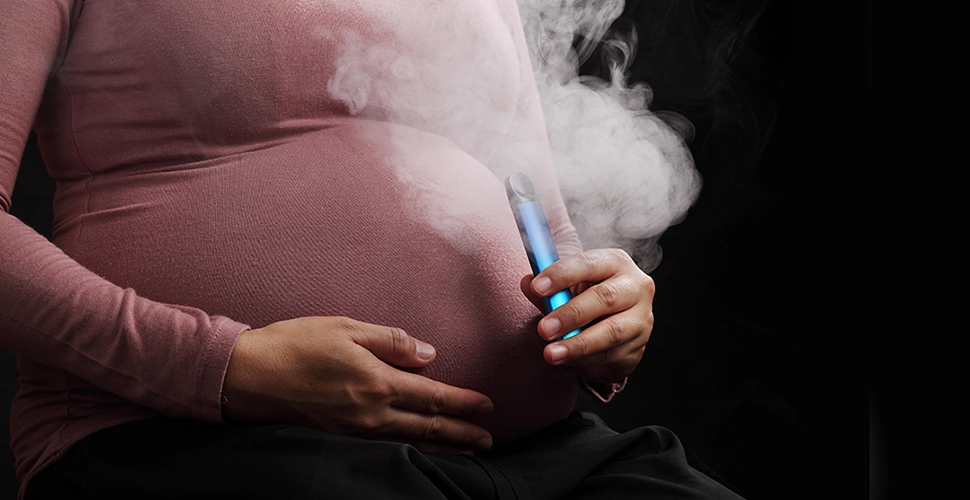 (Asian independent) The use of electronic cigarettes during pregnancy can cause harm to the growing fetus, which can result in complications such as early birth, low birth weight, and potential long-term health concerns for the kid, such as respiratory problems and cognitive deficits. Vaping is something that pregnant women should absolutely avoid doing for the sake of their unborn child’s health.
(Asian independent) The use of electronic cigarettes during pregnancy can cause harm to the growing fetus, which can result in complications such as early birth, low birth weight, and potential long-term health concerns for the kid, such as respiratory problems and cognitive deficits. Vaping is something that pregnant women should absolutely avoid doing for the sake of their unborn child’s health.Employing a towel, the investigators subjected pregnant mice to vapor residue from e-cigarettes, as detailed in the study published in the American Journal of Physiology-Lung Cellular and Molecular Physiology. The evaluation of the immune system in the mice’s progeny revealed notable irregularities in the specialized cells, along with instances of cancer and influenza infections.
The latest study has unveiled, for the first time, the enduring effects on immune cells in the bone marrow and lungs of mice due to third-hand exposure to e-cigarette vapor during pregnancy.
“The research underscores that enduring consequences may arise from third-hand exposure to e-cigarette vapors during gestation.” “It further substantiates the growing body of evidence regarding the risks associated with exposure to e-cigarettes,” remarked Chantal Donovan, the study co-author.
Certainly! Research should also focus on investigating the various elements of e-juice. In addition to nicotine, one can find both natural and synthetic colors, flavorings, and sweeteners, along with PG and VG bases. The effects of these ingredients on a fetus when inhaled in vapor form remain inadequately researched. The majority of the constituents of e-juice were not originally designed for consumption in this innovative manner when they were initially created for human use.
In the absence of empirical studies that confirm safety, it is prudent for expectant mothers to refrain from vaping to ensure the well-being of the baby. If a person decides to vape during pregnancy, disregarding rational considerations, choosing e-juice with fewer active ingredients could potentially reduce the exposure of the developing fetus to various teratogens.
Nicotine, which is found in tobacco and is a highly addictive drug, causes blood vessels to tighten, which in turn limits the amount of blood that flows to the uterus. Because of this decreased blood supply, the delivery of oxygen and important nutrients to the developing fetus can be compromised, which in turn increases the likelihood of a miscarriage occurring throughout the pregnancy. In addition, nicotine can cause an increase in both the mother’s blood pressure and her heart rate, which places additional strain on the cardiovascular system of the mother as well as the developing kid.
Carbon monoxide, which is another toxic component of cigarette smoke, is infamous for its capacity to bond to hemoglobin more strongly than oxygen does. This ability is what makes nicotine so dangerous. This indicates that when a pregnant woman smokes, the carbon monoxide in the blood replaces oxygen, which results in a reduction in the amount of oxygen that is accessible to the developing fetus. Having an adequate flow of oxygen is essential for the regular growth of the baby, and any disturbance in this process can contribute to the chance of having a miscarriage.
There is also a correlation between smoking and an increased risk of difficulties during pregnancy. These complications include placental abruption and preterm rupture of membranes, both of which can lead to a miscarriage. Additionally, the harmful compounds that are present in cigarette smoke have the potential to exert an influence on the DNA of the growing baby, which may result in genetic defects and an increased likelihood of spontaneous abortion.
In conclusion, smoking during pregnancy can result in a miscarriage through a number of different processes, such as decreased blood flow, oxygen deprivation, and an increased risk of problems. Quitting smoking is strongly recommended for the sake of the mother’s health as well as the health of the baby, and obtaining support from medical professionals might be extremely important in order to achieve a smoke-free pregnancy.
Preliminary research indicates that the use of vapes during pregnancy can pose significant risks to the health of infants. Certain advanced nations, including Australia, have implemented vaping restrictions akin to those imposed on smoking in enclosed environments, encompassing workplaces and public areas at large. However, in several developing nations, such as India, populations continue to be vulnerable due to the lack of established regulations regarding e-cigarettes.








